#visual and auditory experience
Explore tagged Tumblr posts
Text
youtube
#Dragon Palace legends#mythical creatures#underwater world#mysterious journey#enchanting visuals#mythical dragons#hidden realm#oceanic mysteries#captivating scenery#fantasy exploration#sea adventure#piano composition#mesmerizing music video#legendary tales#ethereal ambiance#aquatic wonder#visual and auditory experience#mythical realms#underwater mysteries#dreamlike landscapes#mysterious lore#Youtube
0 notes
Text
50+ Sensory Icks That


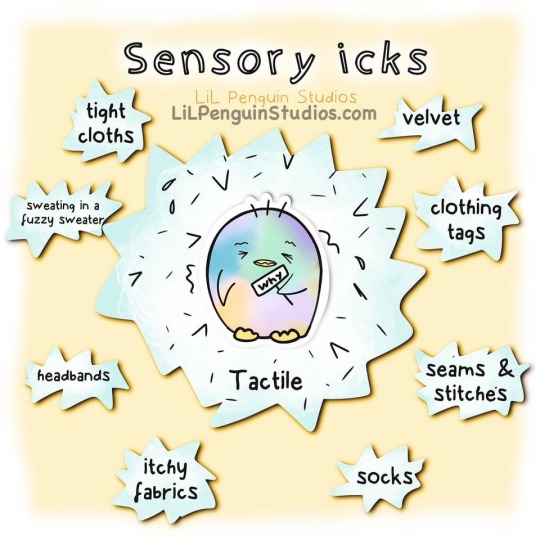

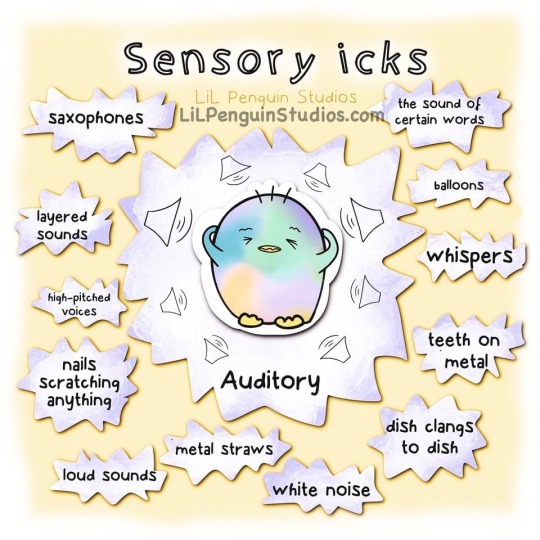
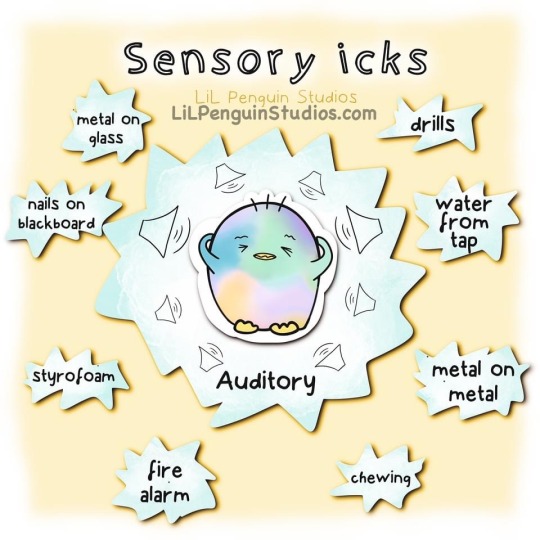


Lil Penguin Studios/Autism Happy Place
#autism#actually autistic#sensory processing#sensory issues#tactile#auditory#taste and smell#visual#sensory icks#personal experiences#feel free to share/reblog#neurodivergence#neurodiversity#actually neurodivergent#Lil Penguin Studios/Autism Happy Place (Facebook)
311 notes
·
View notes
Text
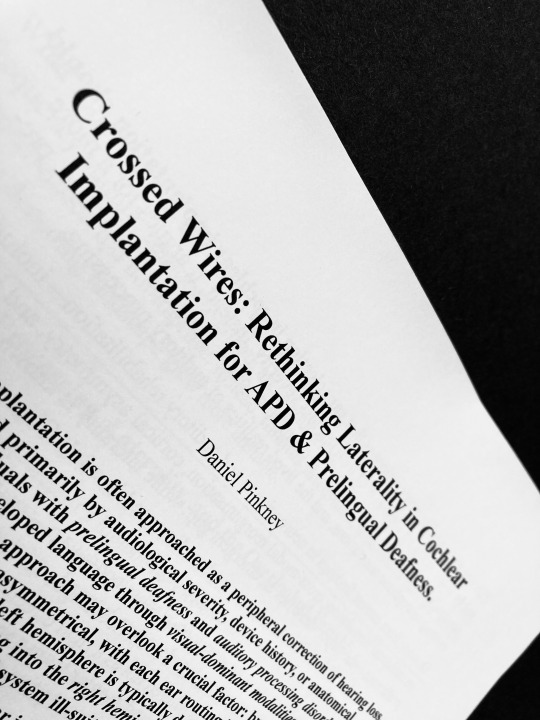
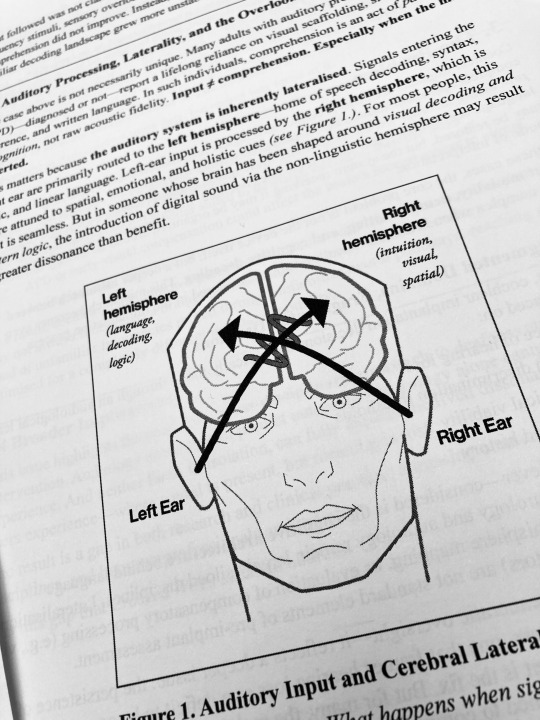
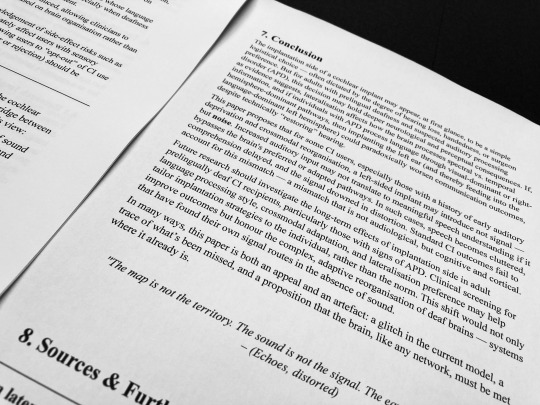
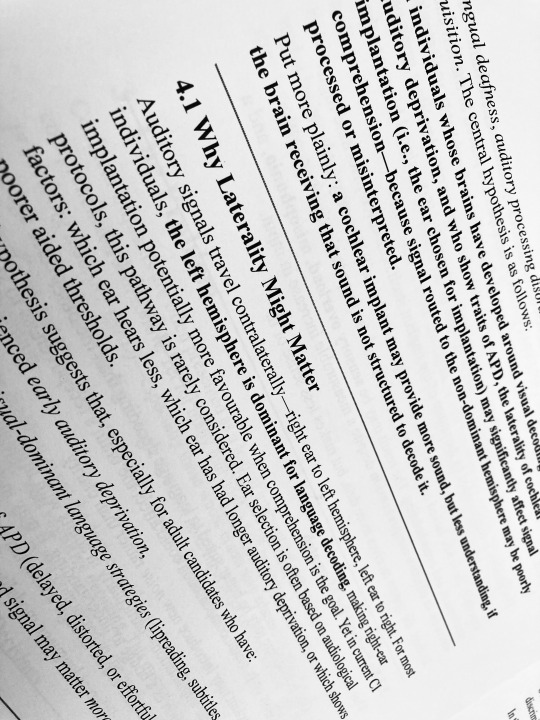
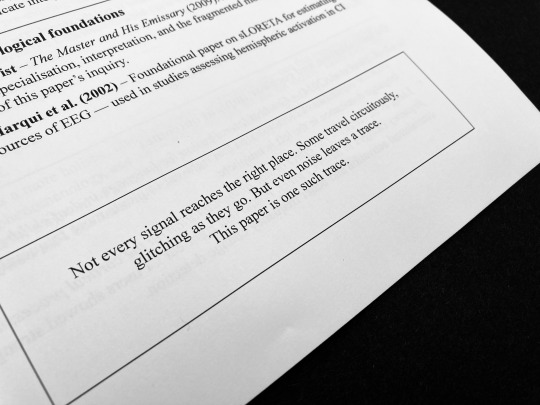
Crossed Wires is now live on OSF — an open-access white paper exploring the overlooked impact of hemispheric lateralisation in cochlear implantation for APD and early-onset deafness. 📄 https://osf.io/pwqr7/
Abstract Cochlear implantation is often approached as a peripheral correction of hearing loss, with ear selection guided primarily by audiological severity, device history, or anatomical constraints. Yet for individuals with prelingual deafness and auditory processing disorder (APD)—particularly those who developed language through visual-dominant modalities such as lipreading and captioning—this approach may overlook a crucial factor: brain lateralisation.
The auditory system is inherently asymmetrical, with each ear routing input to the opposite cerebral hemisphere. Given that the left hemisphere is typically dominant for language decoding, implanting the left ear (feeding into the right hemisphere) may, in some cases, introduce an artificial signal into a neural system ill-suited to interpret it.
This paper proposes that ear choice in cochlear implantation should consider cerebral dominance and sensory compensation history, particularly in older CI recipients with entrenched APD and visual adaptation. Drawing on findings from research on hemispheric language dominance, cortical reorganisation, unilateral vs bilateral stimulation, and cross-modal plasticity, it identifies a critical gap: current CI evaluation protocols rarely account for how early sensory deprivation and neural re-routing shape long-term comprehension.
Evidence suggests CI outcomes can vary based on implantation side (Chilosi et al., 2014) and that unilateral implants may lead to asymmetric cortical dominance with lasting consequences (Gordon et al., 2013).
This paper doesn’t prescribe a universal protocol, but calls for a more personalised, neurocognitive framework—one that recognises that more input does not always mean more understanding, especially when the signal enters the wrong side of a rewired brain.
#crossed wires#process zine#signal // noise#white paper#osf#deaf experience#auditory processing disorder#apd#cochlear implant#neurodivergent#brain lateralisation#crossmodal plasticity#visual language#neuroplasticity#signal vs noise#language pathways#personal science#glitch theory#rewired brain
3 notes
·
View notes
Text
MAN. prosthetic dicks are SO HOT.
BEING ABLE TO FEEL THE STRAP IS JUST- HDHSJSJDDJSJDJDJ
#hornyposting#dude big Gender hours#I love having such a vivid imagination and being able to get off from visual and auditory feedback combined with the pressure#I WANT TO EXPERIEMENT MORE WITH IT SOOOOO BADDDDDDD
12 notes
·
View notes
Text
I've like experienced like pretty mild hallucinations for like ages except ever since I moved out I keep hallucinating cats and it won't stop, it's been like 7 months, it's not even driving me crazy I'm just annoyed
#for context ive lived with cats my entire life most recently living with 3 cats for like 4 years#i tried looking up if hallucinating cats after moving somewhere without them is smth other people experience#but instead all i got was people being spiritual and talking about spirits and guides and how seeing cats that arent real is good actually#not that i rly visually hallucinate cats i see them out of the corner of my eye sure but its mostly auditory and tactile hallucinations
3 notes
·
View notes
Text
if theres any psychologists in the chat: how often do hallucinations need to happen before i worry about them
#bc like#i mainly have auditory hallucinations? i have some visual ones (mainly bugs for some fuckin reason) but 95% of the time its auditory#i cant sleep rn bc i keep feeling paranoid that someones watching me and in my house and i keep hearing whistling#even though i literally went and searched my apartment 5 times and NOTHING!#i keep feeling paranoid but like i KNOW im being paranoid thats the annyoing part#but yea i dont get them often or anything? i experience them like 3/4 times a month (sometimes more but nothing crazy)#like how many days does it have to be before i talk to a doctor about it#btw i experienced hallucinations since i was like 11 but theyve def increased in frequency over the years
2 notes
·
View notes
Text
youtube
X7Q5A96, 091728364551927480, 2025
#video#abstract#art#visual arts#experimental#curators#animation#experience#auditory experience#visual stim#video animation#Youtube
0 notes
Text
The story lessons on Duolingo are usually pretty silly, but the one I did tonight actually had a concept I think would be really interesting....
It was about going to see a play where the theater lights weren't working for some reason, but it was enjoyable anyway.
And I was thinking, this could be super neat to do on purpose? Intentionally put on a play where the lights aren't fully used. There was a mention of a flashlight in the story, and that could be such an interesting way to use light and the lack of it in unique ways....
A play where you're mostly listening, because it's too dark to see for the most part, but occasionally there are small spots of light from flashlights or similar small, portable lights? I bet that would be a really cool experience, done right
I'm imagining the dialogue and how the only way to tell characters apart is by how they speak.... we don't really ever see costumes.... when would the flashloght be used, and why? Could be a climactic moment..... I don't even know what the plot could be but I'm sure there are lots of things that could be done with this concept
#stella speaks#i'm the kind of storyteller who's really only good at one medium#novels and occasional short stories and even rarer poems are the only kinds of stories i'm good at telling#but i do so often love to think about other storytelling mediums and ways to really use the medium#to tell a story you can't tell with any other medium#i find it fascinating#plays are a visual and auditory medium with a live element#(pardon my bad explanation i'm far far far from knowledgeable about theater lol)#but what would happen if you took away (mostly) the visual element? how would that change the experience?#i'm not the person to do this but i would absolutely love to see someone else try#can't stop thinking about this!
0 notes
Text
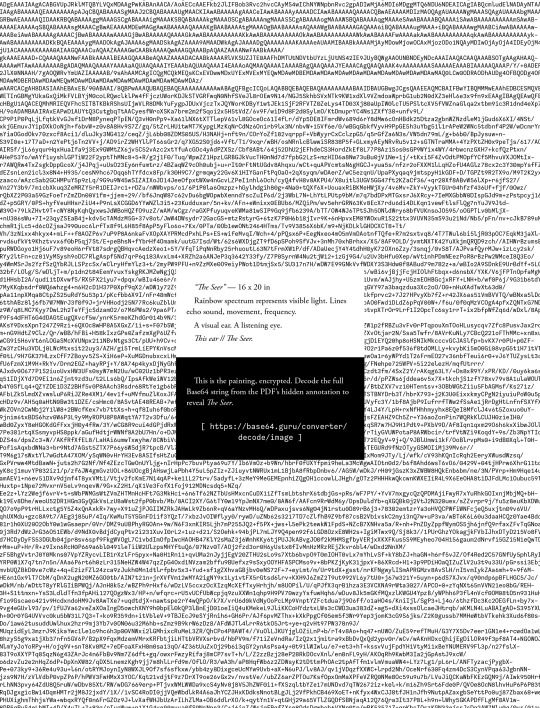
🌀 "The Seer", encrypted.
A work in process for process zine #00 — this spread translates a full-colour painting into raw Base64 code. The wall of characters becomes a veil, a kind of static field — a metaphor for the liminal experience of Auditory Processing Disorder (APD), where the signal is present but inaccessible without the right decoder.
The artwork, The Seer, is hidden in plain sight. Digitised, fragmented, and embedded in the code itself.
When the zine is complete, the full Base64 string will be included as a hidden annotation in the digital PDF. Readers will be able to extract and decode the painting — transforming static back into signal, and signal into sight.
For now, it exists as encrypted presence.
This is the painting, encrypted. Decode the full Base64 string from the PDF’s hidden annotation to reveal The Seer.
#base64#encryption#code to image#signal and noise#decode#APD#auditory processing disorder#liminal experience#visual poetry#data as art#glitch aesthetics#conceptual art#process zine
0 notes
Text
Writing a Schizophrenic Character: Everything But Hallucinations
Plain text: Writing a Schizophrenic character: Everything But Hallucinations
Hey! Mod Bert here.
So: you’ve decided to write a character with schizophrenia or schizoaffective disorder (there are other disorders on the schizophrenia spectrum but I will be focusing on these for today)
You’ve done it, you have their hallucinations and maybe even delusions picked out. Maybe they are one of many who experience auditory hallucinations or maybe they also have visual hallucinations or a combination. Maybe they have olfactory hallucinations as well. They may have persecutory delusions or delusions of reference or something like Cotard’s delusion or clinical lycanthropy. Awesome, you’ve done it!
What, I hear you say? What do you mean that’s only 2 of the 5 components needed to be diagnosed with schizophrenia? What do you mean, you don’t need to hallucinate at all to be schizophrenic?
What Goes Into a Diagnosis of Schizophrenia
Plain Text: What goes into a diagnosis of schizophrenia
Not a lot of people realize there’s more to schizophrenia and schizoaffective than just hallucinations or delusions. There are 5 diagnostic criterias that are needed for schizophrenia, and only 2 of the 5 are needed for a month, with larger symptoms happening for six months or more. Let’s get into it.
Delusions
Hallucinations
Disorganized speech or thinking*
Disorganized or unusual motor behavior (catatonia)*
Negative symptoms (avolition, anhedonia, flat affect)*
I’m going to focus on disorganized speech/thinking, catatonia, and negative symptoms.
Disorganized Speech/Thinking
Plain Text: Disorganized Speech/Thinking
Schizophrenia and related disorders are often called “thought disorders” for a reason. Speech and thinking can be extremely affected, and for people like me this can be one of the first and most striking examples of an episode coming. Some people will always have disorganized symptoms that will flare during episodes. A myth is that schizophrenia can be indistinguishable with medicine: most people will have some level of symptoms even during moments of peace or “remission”. More on remission later.
So, disorganized speech. Some examples are: word salad (schizoaphasia), thought blocking, poverty of speech (alogia), pressurized speech, clanging, and echolalia.
Word salad: a combination of words that do not make sense together. Often called schizoaphasia for its similarity to jargon in Wernicke’s aphasia, this is instead a disconnection with the brain and not due to damage to the language part of the brain.
(Example: the salad would be yellow in the fat cow).
Thought blocking: A severe loss of thought, often paired with connecting two trains of thought that are not connected
(Example: I went to the………Do you like grapes?)
Poverty of speech: A lack of organic responses to speech or organically speaking, it can be severe enough that a person only responds to questions or in one word responses. Can also happen in severe depression.
(Example: Person A: Did you do anything fun today?
Person B: Yes.
Person A: Oh, what did you do?
Person B: Store
Person A: How was it?
Person B: Fun)
Pressurized speech: A sort of frenzied way of speaking associated with psychosis or mania.
Clanging: Connecting phrases together because of what they sound like instead of meaning
(Example: I went bent tent rent).
Echolalia: Repeating word’s and phrases. Commonly also associated with Autism Spectrum Disorder.
(Example: Person A: I went to the store.
Person B: To the store.)
These are not the only examples but they are some ones I thought I'd highlight, either because they’re well known or I have experience with them, or because they’re famously thought of with other disorders as well and I wanted to point out how things overlap.
Personal experience: I had severe alogia for the duration of my last and worst episode. People thought I was mad at them because of the clipped way I spoke and the lack of really speaking. It got me in a lot of trouble. I didn’t realize what I was saying was different or weird (I have the least insight when it comes to my speaking patterns affected by my schizoaffective, meaning I can’t hear any difference and all of this is from repeated conversations with my mom, who was my caretaker for a bit and knows the most about my speech and what it means). The best solution was talking with people and being honest and educating myself and others. I don’t know about others, but I couldn’t have used AAC at that time.
Catatonia
Plain text: Catatonia
Fun fact: catatonia means unusual motor behaviors! Any unusual motor behaviors mean catatonia. This includes what we think of when we think of catatonia in schizophrenia (inability to move) as well as the opposite (being unable to stop moving) as well as strange movements and ways of holding and moving the body! Catatonia in the DSM-5 includes 3 or more of these 12 behaviors:
-Agitation unrelated to external stimuli
-Catalepsy
-Echolalia
-Echopraxia
-Grimacing
-Mannerism
-Mutism
-Negativism
-Posturing
-Stereotypy
-Stupor
-waxy flexibility
I have some experiences with catatonia-like symptoms but since they were never identified as such I’ll skip those for now. I will say that catatonia is a symptom that can happen in many disorders besides schizophrenia as well.
Negative Symptoms! Yay!
Plain text: negative symptoms! Yay!
So a positive symptom (Hallucinations or delusions) are symptoms that add something to reality or a person. Negative symptoms are symptoms that take away. There are 5 A’s:
-Alogia (Again, poverty of speech, our favorite)
-Avolition (Lack of energy and motivation)
-Affect (Blunted affect, or a flat way of speaking)
-Anhedonia (Lack of pleasure in things that used to bring you pleasure, often thought of with depression)
-Asociality (Lack of interest in social events and relationships)
There are also often cognitive changes including thinking and memory, information recall, understanding, and acquisition, and so forth.
Schizophrenia and schizoaffective often (but not always) happen with what’s called a prodromal period. This period can be months to years (mine was a little less than a year) and mainly consists of negative symptoms. Slowly, positive symptoms are added. There are thought to be stages to schizophrenia including prodrome, active phases, and remission.
I’ll talk about that a little for a second because I’m currently in remission and no one knows what that means. I was diagnosed with schizoaffective depressive type in January 2021. As of February 2024, I no longer qualified to be rediagnosed because my symptoms were strongly under control and no longer severe enough to qualify for a diagnosis. They also didn’t distress me or impact my daily life severely. Day to day now I still have mild symptoms and take my antipsychotics (trying to go off them have made it clear that I still have some symptoms I choose to keep medicating) but I haven’t had a delusion in 2 years and been hospitalized in 3. There’s always a possibility of another episode but I work with my team to keep myself one step ahead if that happens.
What I want from a character with schizophrenia
Plain Text: What I want from a character with schizophrenia
Alright the writing advice part. What do I want from a character with schizophrenia or schizoaffective (which is schizophrenia plus either depression or bipolar).
-Characters with caregivers.
-Characters using coping strategies (recording hallucinations to tell if theyre hallucinations, taking medication, having service animals that greet people so they know if they’re a hallucination, using aids for the cognitive symptoms like sticky notes and organizational tools)
-Characters who know other characters with their disorder, either online or in support group or through running in similar circles
-Characters having autonomy
-Characters who aren’t the killer or horror victim. I know it’s cool to have the schizophrenic protagonist in horror, and I love horror, but I don’t want to read about the horror being symptoms the whole time
-Characters who are in magical scenarios, who are in fantasy and sci-fi. The schizophrenic princess and the schizoaffective robot technician aboard the spaceship.
-Medication and hospitalization treated casually. Sometimes we need higher care. That’s morally neutral
-Characters with negative symptoms and speech symptoms.
-Characters with catatonia!
-Characters with other disorders as well
-characters with side effects from medicine treated casually
-Characters with cognitive symptoms
Thank you for reading this incredibly long thing! Happy writing!
3K notes
·
View notes
Text
˖ ִ𐙚 Holotropic Breathwork + Hypnagogic Hallucinations 𝜗࣪˖

HOLOTROPIC BREATHWORK
"Holotropic Breathwork is a therapeutic breathing technique that uses rapid, controlled breathing and music to create an altered state of consciousness."
The process bypasses your analytical mind and taps into the subconscious, often bringing up suppressed emotions, vivid imagery, or even spiritual insights. It’s often used for self-discovery, emotional healing, and connecting more deeply with your inner self.

HYPNAGOGIC + HYPNOPOMPIC HALLUCINATIONS
Hypnagogia and Hypnopompia are transitional states of consciousness that occur during the process of falling asleep and waking up, respectively.
Hypnagogia is experienced as you are falling asleep. It often happens when you’re extremely tired or sleep-deprived, such as after staying up late or napping during the day. In this state, you may not fully fall asleep but instead enter a semi-conscious phase. During hypnagogia, people can feel as though they’re “dreaming while awake.”
Hypnopompia, on the other hand, happens as you are waking up. You might not fully regain consciousness and instead linger in a dream-like state. In this phase, you may feel as though you are simultaneously awake and dreaming, struggling to differentiate between the two. Similarly, people can feel as though they're "awake while dreaming."
These may involve visual, auditory, or tactile hallucinations, and sometimes even a sensation similar to sleep paralysis. Both phenomena occur because the brain is transitioning between wakefulness and sleep, creating a blend of conscious awareness and dream-like perceptions. While they can feel disorienting, these experiences are a natural part of how our brain processes the sleep cycle.

Routine combining both methods:
Step 1: Get Comfortable
Lie down (preferably) in a quiet, dimly lit space where you won’t be disturbed.
Close your eyes and relax your body.
Step 2: Breathwork to Relax (2-5 minutes)
Breathe in deeply through your nose for 2 seconds.
Exhale out through your mouth with a gentle "ha" sound.
Repeat this rhythm, focusing on how your body feels lighter and more relaxed with each breath.
Step 3: Focus on the Darkness
Let your breathing return to normal.
Shift your attention to the darkness behind your eyelids.
If you see shapes, colors, or feel sensations, let them happen naturally.
Step 4: Affirm and Intend
Silently or softly affirm your intention:
“I am pure consciousness.”
“I am shifting now.”
Stay calm and trust the process as you drift deeper into the void or shifting state.
Step 5: Let Go
Allow yourself to fully relax, knowing that you’re transitioning.
If you feel close to the void or shifting, focus on staying calm and open.

Holotropic Breathing Posts:

Hypnagogic + Hypnopompic Hallucinations Posts:

#empyrealoasis#void state#void success#void#void concept#loa#law of assumption#master manifestor#pure consciousness#manifest#shifting#reality shifting#4d reality#desired reality#quantum jumping#shiftblr#loablr
1K notes
·
View notes
Text
I love you psychotic pagans
• Pagans that get delusions that interfere with worship!
• Pagans that get religious delusions! Delusions of grandeur! Delusions of control!
• Pagans who can’t discern between hallucinations, delusions, and the Gods!
• Pagans who get hallucinations of the Gods!
• Pagans that get auditory hallucinations! Tactile hallucinations! Visual hallucinations! Olfactory hallucinations! Internal hallucinations!
• Pagans who get intrusive thoughts!
• Pagans who experience negative symptoms that make it hard to worship!
• Pagans whose psychosis makes it hard to worship in general!
• Pagans who think their psychosis brings them closer to the Gods!
• Pagans who get disorganized thoughts. Who can’t pray because of them!
• Pagans on medication! Pagans who can’t be medicated, who don’t want to be medicated, who aren’t medicated!
You’re all seen. You’re all loved. The Gods understand when things get tough.
#hellenic pagan#norse polytheism#deity worship#egyptian paganism#hellenic paganism#hellenic polytheism#egyptian pagan#norse paganism#norse pagan#egyptian polytheism#paganism#paganblr#pagan witch#eclectic pagan#pagan#schizophrenia#schizospec#shizoaffective#psychosis#religious psychosis
671 notes
·
View notes
Text
Hate when you say you want a lobotomy and someones like "omg no lobotomies are horrible don't joke about that" like shut up you think I don't know what a lobotomy does ? Of course I do and I want that
#am i being serious ?#youll never know#anyway i keep hallucinating to people to the point that i am genuinely questioning some experiences#at work today whilst i was taking an order someone was standing behind me and like waiting i think#except i didnt interact with them just periodically looked at them#and when i finished taking the order the person behind me was just fucking gone#also i dodnt see their face and was just generally losing it during my shift#so i have no fucking idea of that person was real or not#i love using the notes of my posts to tell random stories about my life#anyway idk whats worse visual or auditory hallucinations#obviously tactile are the absolute worse though
2 notes
·
View notes
Text
Let’s say that there is a type of alien who primarily experiences the world through smell and secondarily experiences the world through taste.
With their advanced technology, they have orbs that they can wrap around that can produce almost any taste or scent within their perception, analogous to our visual and auditory televisions.
Other than their senses, they are much like us, and enjoy the exact same stories that we do.
Would it be possible for their olfactory and gustatory devices to convey the same types of complex characters and narratives? Could a human ever appreciate the “films” on the orb? Could one of such aliens ever appreciate human cinema? Could Shakespeare be translated wholly and completely onto the orb? Could a classical work of alien fiction ever be remade for human eyes and ears?
Let’s say that they can see about as well as we can smell and hear about as well as we can taste. Could we even meaningfully communicate at all?
596 notes
·
View notes
Text
Word List: Psychology

more psychological concepts as reference for your poem/story
Telepathic dream - a dream in which one appears to gain insight or information about a person or event despite not having access to the relevant information in waking life; described by Sigmund Freud.
Thought echoing - (or écho des pensées) an auditory hallucination in which an individual hears their own thoughts repeated in spoken form.
Trait rumination - a tendency to focus attention on negative thoughts and emotions, which is associated with longer and more severe episodes of depression or anxiety.
Twilight state - a state of clouded consciousness in which the individual is temporarily unaware of their surroundings, experiences fleeting auditory or visual hallucinations, and responds to them by performing irrational acts, such as undressing in public, running away, or committing violence. The disturbance occurs primarily in temporal lobe epilepsy, dissociative reactions, and alcohol intoxication. On regaining normal consciousness, individuals usually report that they felt they were dreaming and have little or no recollection of their actual behavior.
Universality of emotions - the finding that certain emotional expressions, appraisals, and manifestations are the same or highly similar across cultures and societies.
Waking dream - an episode of dreamlike visual imagery experienced when one is not asleep. The term is sometimes applied to hallucinations, religious visions, and the like.
Windmill illusion - an illusion of motion of rotating objects, such as windmills and automobile wheels, which appear to reverse direction intermittently.
Xenoglossy - in parapsychology, the ostensible ability of a person to speak or write in a language that is entirely unknown to them.
Yantra - a visual pattern on which attention is focused during concentrative meditation.
Zeigarnik effect - the tendency for interrupted, uncompleted tasks to be better remembered than completed tasks. Some theorists relate this phenomenon to certain gestalt principles of organization but at the level of higher mental processing (e.g., memory), rather than at the level of pure perception; described in 1927 by Bluma Zeigarnik.
Source ⚜ More: References ⚜ Part 1 2 3 4 5 ⚜ Writing Resources PDFs
#writing notes#psychology#character development#writeblr#dark academia#spilled ink#literature#writers on tumblr#writing reference#writing prompt#poets on tumblr#poetry#creative writing#novel#lit#light academia#writing ideas#writing inspiration#character building#dante gabriel rossetti#writing resources
411 notes
·
View notes
Text
At the Top of Her Lungs Reese the Ram and Elise Graves Welcome to the wonderful world of the Iron Lung. And, welcome to Reese the Ram. She is not only gorgeous, but also deeply kinky. It is evident that Reese falls in love with the Iron Lung right from the start. Wearing a bolero canvas straitjacket, with her ankles held apart with ankle cuffs, Reese’s body is mostly notably restrained by her neck - tightly secured in the neck piece of the Iron Lung. From the first moment that Nurse Elise flips the switch, we are gifted the auditory and visual pleasures of witnessing Reese deal with this machine breathing for her. In the beginning her breathing sounds a bit similar to a death rattle, but rest assured, she relaxes and allows the machine to do the one thing it was created for - to make a person breathe! At some point, Nurse Elise desires to make this experience more enjoyable for Reese, and therefore unlatches one of the ports on the side of the lung, and reaches inside toward Reese with a vibrator. Watch and listen to Reese have multiple orgasms inside this lung! So hot!
235 notes
·
View notes